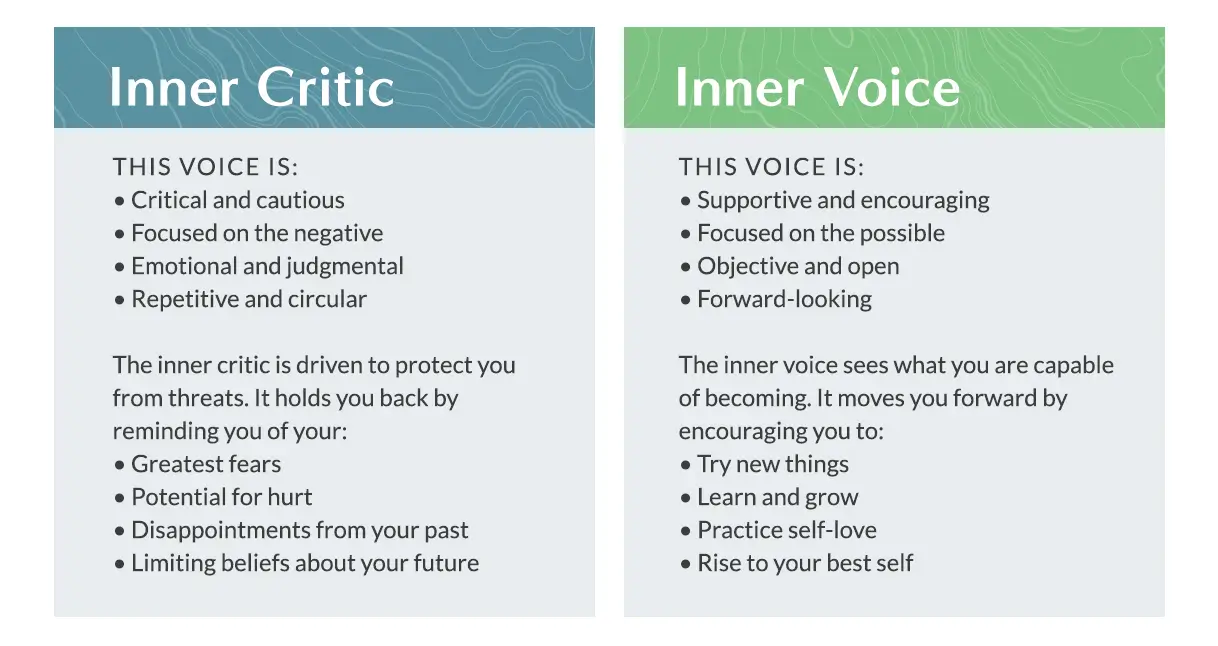
Day in and day out, countless thoughts and storylines run through our minds. These complex narratives are focused primarily on ourselves and our interactions with the world around us.
While these thoughts are normal, there is one particular voice that can sabotage even the most talented leader: the inner critic. This is the critical -- and sometimes relentless -- voice that says: "you can't," "you shouldn't," or "you won't."
To lead at your best and demonstrate a strong executive presence, you must learn how to overcome the power of the inner critic and how it holds you back. That begins with recognizing the difference between the inner critic and the inner voice. How can you tell them apart? Let's take a closer look.

How the inner critic works
Why do we have an inner critic? For one very good reason: protection. Your inner critic is entirely focused on helping you avoid potential threats. This protection instinct, driven by the limbic system, is designed to scare you away from doing anything that could force you to face a fear. When you experience something undesirable such as embarrassment or rejection, your brain will immediately sound the alarm and shift into 'fight or flight' mode.
As a result, you take fewer chances. You'll avoid some threats, for sure. But the trade-off is that you'll miss out on some wins – perhaps a true game-changer. Coming off as too cautious will definitely detract from your executive presence.
You can stop this self-defeating pattern by recognizing how your inner critic works and taking steps to reduce its share of mind. Here are two common inner critic strategies designed to hold you back. Have you experienced either one?
Rationalization
Your inner critic comes up with reasons you should not attempt something where the outcome is uncertain. These reasons sound completely rational, and they appeal to our sense of safety. For example:
Opportunity: You want to apply for a position that would be a promotion from your current role.
Rationalization: Your inner critic tells you the promotion will only go to someone with far more experience. That your skills aren't perfect. And you don't know the person who is hiring anyway. So, you shouldn't bother to apply.
Fear: The real reason you don't apply is you are afraid it will be an indictment of your skills if you don't get the job.
Procrastination
Your inner critic creates excuses that allow you to put off doing something you don't want to do. These excuses sound plausible and work to get you off the hook from facing a deeper fear underlying the task you're avoiding.
Opportunity: A key business leader asks you to meet with her to walk her through some questions about the monthly financials.
Procrastination: You tell her you just don't have time, but she can share any questions with you in writing that you'll respond to.
Fear: The real reason you don't want to meet with her is that you're not comfortable with your knowledge of finance and you don't want to appear incompetent in the meeting.
The key is to recognize when either of these strategies is happening and, instead of falling into their trap, you deal with the underlying fear.
Considering how your inner critic works, take a moment to answer these questions.
What rationalizations do I often tell myself?
What do I most often procrastinate about?
What fears am I avoiding?
What would it look like if I dealt with these fears?
Identifying your inner critic allows you to sort through the destructive thoughts that undermine your success as a leader. More importantly, you will see stronger results in your executive presence when you tame the critic and accelerate toward your goals.
You can learn more about mastering executive presence, in my guide, The "It" Factor: What Will Get You Further Faster.



